| | | | | | | Presented By Google | | | | Axios AM | | By Mike Allen ·Feb 10, 2022 | | Good Thursday morning. Smart Brevity™ count: 1,498 words ... 5½ minutes. Edited by Zachary Basu. 🧁 Happy first birthday to our pioneering colleagues at Axios HQ, our software tool for bringing Smart Brevity to your organization. The celebration included an epic Jenga game, to be known forevermore as Staxios. Go deeper. | | | | | | 1 big thing: 🚽 Trump's toilet dump |  | | | Cover: Penguin Press | | | | While President Trump was in office, staff in the White House residence periodically discovered wads of printed paper clogging a toilet — and believed the president had flushed pieces of paper, Maggie Haberman scoops in her forthcoming book, "Confidence Man." - Why it matters: The revelation by Haberman, whose coverage as a New York Times White House correspondent was followed obsessively by Trump, adds a vivid new dimension to his lapses in preserving government documents. Axios was provided an exclusive first look at some of her reporting.
Haberman reports Trump has told people that since leaving office, he has remained in contact with North Korean leader Kim Jong-un — whose "love letters," as Trump once called them, were among documents the National Archives retrieved from Mar-a-Lago. Zoom out: The news of White House toilet-flushing comes as the National Archives has reportedly asked the Biden Justice Department to examine Trump's handling of White House records, amid the congressional investigation into the Jan. 6 assault on the Capitol. - The Washington Post reports that National Archives officials "suspected Trump had possibly violated laws concerning the handling of government documents." The National Archives later retrieved 15 boxes from Mar-a-Lago, The Post reported.
- Archives officials found possible classified material in the returned boxes, The New York Times learned.
While in office, the former president blithely flouted the Presidential Records Act, which required him to preserve written communications concerning his official duties. - Trump routinely tore up documents and after leaving office brought substantial written materials back to Mar-a-Lago.
- A Trump spokesman didn't respond to a request for comment about the plumbing matter.
Zoom in: Haberman's "Confidence Man" — subtitled "The Making of Donald Trump and the Breaking of America" — will be published Oct. 4 by Penguin Press. - The publisher says it traces Trump's early life in New York and "his decades of interactions with prosecutors" — then follows him through four years in the White House, and on to his post-presidential life in Palm Beach.
The intrigue: This is the book Trump fears most. Among Trump aides, Haberman's book has been the most discussed of the bookshelf of books from reporters who covered Trump's campaigns and White House. - Several advisers were unhappy about his decision to talk to her as part of his marathon conversations with book authors at Mar-a-Lago. But they concluded he couldn't help himself and couldn't be stopped.
Haberman, a lifelong New Yorker, has covered Trump extensively since 2011, when she was a Politico reporter. Earlier, she got to know his Manhattan milieu as a reporter for the New York Post and Daily News. Share this story ... Preorder book. |     | | | | | | 2. America's great unmasking |  | | | Illustration: Brendan Lynch/Axios | | | | States across the U.S. have begun another great unmasking as they prepare to enter the post-Omicron phase of the pandemic, Axios health care editor Tina Reed reports. - Why it matters: Reasonable experts don't exactly agree on whether it's the right time to start exposing our faces in public again. That makes it difficult to gauge how much of this broader shift is based in science versus changing risk tolerance.
"We're starting to get to this place where there's almost a cultural shift ... where there's an acceptance around certain types of risk," Erica Johnson, chairwoman of the Infectious Disease Board of the American Board of Internal Medicine, told Axios. - She and several other experts indicated that based on the trajectory of cases and hospitalizations — as well as the presence of vaccines and effective treatments for COVID — planning to end mask mandates was reasonable.
- But there's no consensus. "Judging by the daily death counts and the stress on hospitals, I would say it's a little premature," Jeremy Faust, an emergency physician at Brigham and Women's Hospital in Boston, told Axios.
Reality check: We've been here. |     | | | | | | 3. U.S. warns protest convoys could hit Super Bowl, SOTU | Protesters block a highway to the Blue Water Bridge border crossing — a key trade artery to the U.S. — in Ontario, Canada, yesterday. Photo: Carlos Osorio/Reuters A Department of Homeland Security bulletin warns law enforcement across the U.S. that a convoy of truckers protesting vaccine mandates, similar to protests in Canada, could begin soon in the U.S., CNN reports. - A DHS official told Yahoo News truckers could "follow the Canadian model and shut down Washington."
The bulletin says DHS "has received reports of truck drivers planning to potentially block roads in major metropolitan cities in the United States in protest of, among other things, vaccine mandates for truck drivers." - The Super Bowl is Sunday in L.A. The bulletin says the convoy could "begin in California as early as mid-February and arrive in Washington, DC, as late as mid-March, potentially impacting" the game and President Biden's State of the Union address on March 1.
|     | | | | | | A message from Google | | Google reduces account hijackings by up to 50% | | | 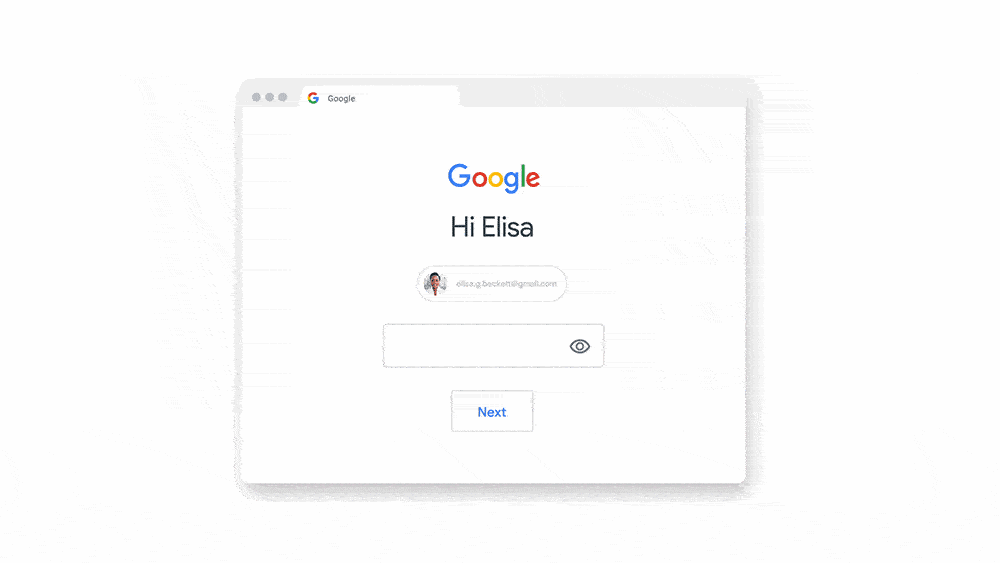 | | | | To help protect user data, Google has proactively auto-enrolled more than 150 million Google Accounts in two-step verification. People enrolled in Google's two-step verification were less than half as likely to suffer unauthorized account access than before enrollment. Learn more. | | | | | | 4. 📷 Pics of the day | | Team USA's Nathan Chen free-skating in Beijing today. Photo: Jeff Roberson/AP Breaking: With a nearly perfect free skate on the heels of a record-setting short program, Nathan Chen, a 22-year-old Yale student, walked away with gold at the Beijing Games today, AP reports. - He became the first American figure skating champion since Evan Lysacek in 2010, and capped one of the most dominant four-year runs in the history of the sport.
Video. Photo: Julian Finney/Getty Images Above: Australia's Nicholas Timmings slides during men's skeleton heats at the National Sliding Centre in Yanqing, China, today. |     | | | | | | 5. Weekly map: Cases plummet |  Data: N.Y. Times. Cartogram: Kavya Beheraj/Axios New COVID cases are plunging all across America, and Omicron's death toll is also slowing down, Axios' Sam Baker and Kavya Behera report. - Why it matters: The U.S. is on its way out of this wave of the pandemic after less than two months.
The U.S. is now averaging roughly 240,000 new cases per day — a 61% drop over the past two weeks. - Deaths are still rising. But those increases are slowing considerably — a sign they soon may decline.
- The U.S. is now averaging roughly 2,500 new deaths per day. Those deaths are almost entirely preventable with vaccines.
Share this map. |     | | | | | | 6. Online betting comes for kids |  | | | Illustration: Annelise Capossela/Axios | | | | A slew of apps and games that simulate sports and casino betting are gaining popularity among middle-schoolers, Axios' Erica Pandey reports. - Why it matters: The line between gaming and gambling is getting blurrier. Social betting, which involves no real money, can lead kids to the real thing, experts say.
Global downloads of social gambling apps increased from 33 million in 2012 to 1.4 billion in 2020, according to an analysis of Android app data by David Zendle, a University of York expert on the effects of video games. - Of 1,132 "social casino" games analyzed, 1,107 — nearly 98% — had an age rating of 12+ or lower.
- Age restrictions are often easy to circumvent.
💡 The takeaway, from Axios Sports editor Kendall Baker: Younger generations tend to view betting as a game of skill, rather than gambling. |     | | | | | | 7. Axios walkalong: Dog vs. rat | 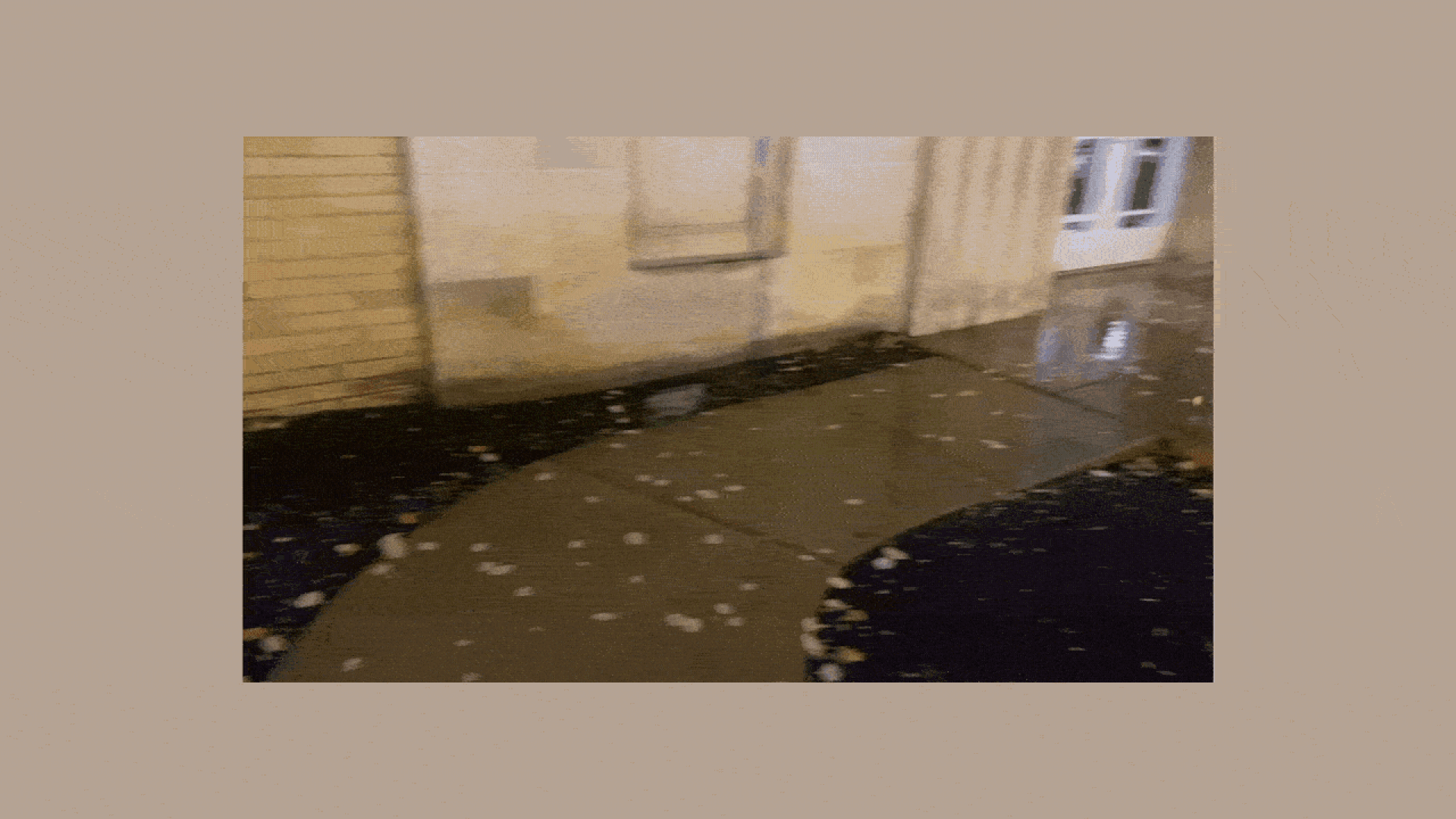 | | | A rat scurries away while Manny catches a breath. Video: Cuneyt Dil/Axios | | | | Manny — a 91-pound, 9-year-old Akita — is a mobile weapon as D.C. residents get increasingly creative with their rat resistance, Axios D.C.'s Cuney Dil reports. - Manny leaps on trash cans, hounds bushes — and races rats.
Why it matters: The pandemic spurred a migration of rats from restaurants to city homes, as more people stayed in to eat.  Data: Open Data DC. Chart: Danielle Alberti/Axios What's happening: Last year saw a record-high 12,638 complaints to D.C.'s 311 about rodents and insects. Calls have soared 130% since 2017. |     | | | | | | 8. 🍕 1 for the road: We try a pizza vending machine | 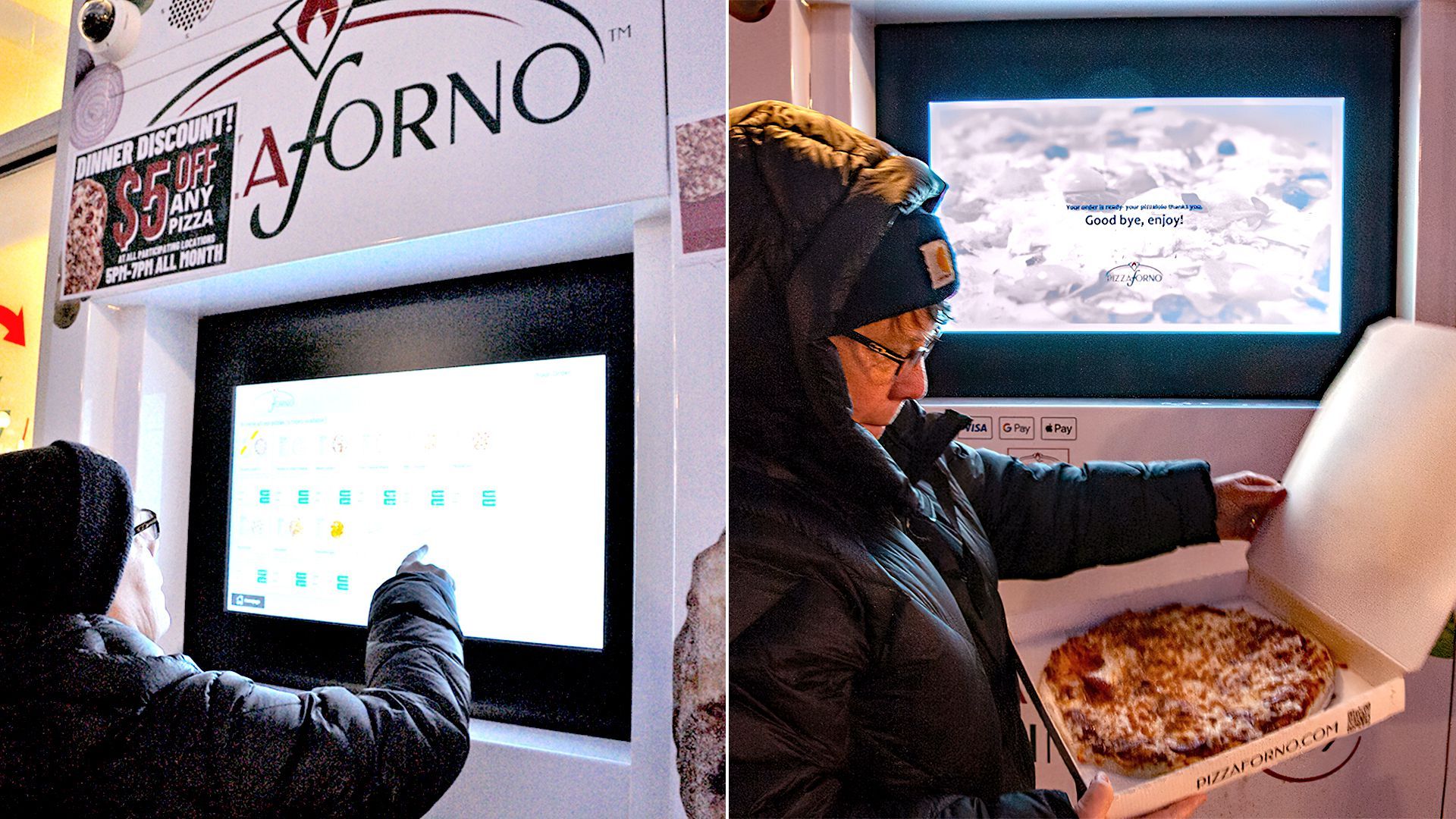 | | | Joann Muller buys a pepperoni pizza to go from PizzaForno's automated vending machine. Photos: Bill Rapai for Axios | | | | These days pizza can arrive by car, bot and drone. Axios' Joann Muller tried the latest delivery device — a vending machine. - PizzaForno, a Toronto-based company, is rolling out automated pizza vending machines across North America, including in Michigan and other U.S. locations.
- For $10 to $13, you can get a hot, 12-inch pizza in under three minutes.
How it works: The pizza is fresh, not frozen, and made by humans but served by a robot. - Assembled at a regional commissary with "hand-stretched crusts" and local ingredients, the uncooked pizzas are loaded into the refrigerated section of PizzaForno's 65-square-foot automated oven.
- The customer chooses a pizza from the menu. Behind the scenes, a robotic arm transfers the selected pizza to the oven.
Once baked, it's placed in a box, which emerges from a slot in the storefront like money from an ATM. - Each machine holds 70 pizzas, which have a three-day shelf life. Workers restock the machine with fresh pizzas three times a week.
Joann chose a $12 pepperoni pizza the other night from a PizzaForno machine in Ann Arbor, near the University of Michigan campus. - The pizza looked and smelled delicious. The dough was limp, though, and the flavors were lacking.
💡 Pro tip: There's a slot in the wall to grab a single-serve, biodegradable knife. You can also get an uncooked pizza to take home for $1 off. |     | | | | | | A message from Google | | Google and Khan Academy partner to teach online safety | | | 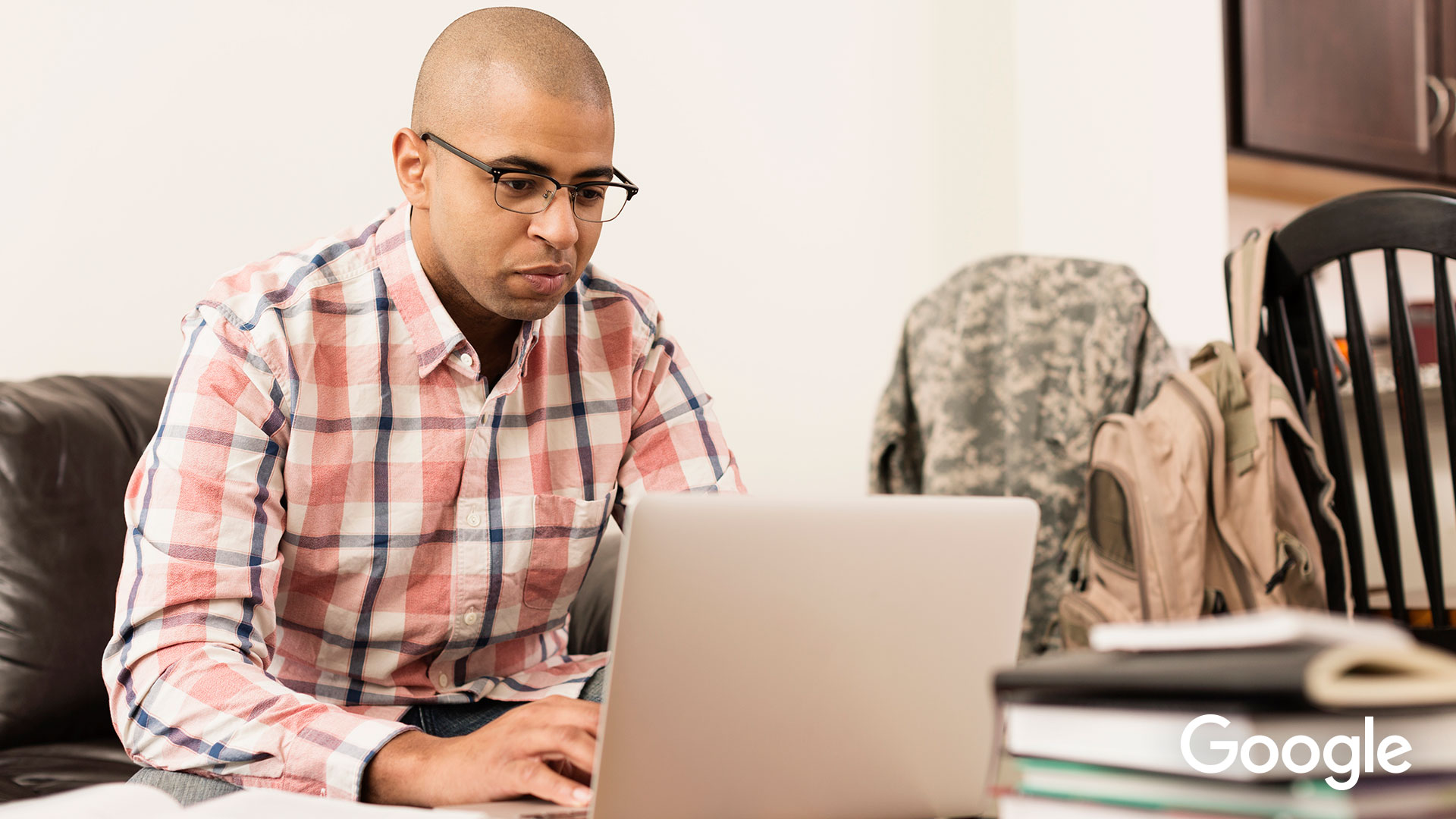 | | | | In addition to Google's $10 billion commitment to advancing cybersecurity, Google is contributing $5 million to Khan Academy to develop free online safety lessons that will help teach people how to protect themselves on the internet. Learn more. | | | | 📬 Was this email forwarded to you? Sign up here for your own personal copy of Axios AM and Axios PM. |  | Bring the strength of Smart Brevity® to your team — more effective communications, powered by Axios HQ. | | | |








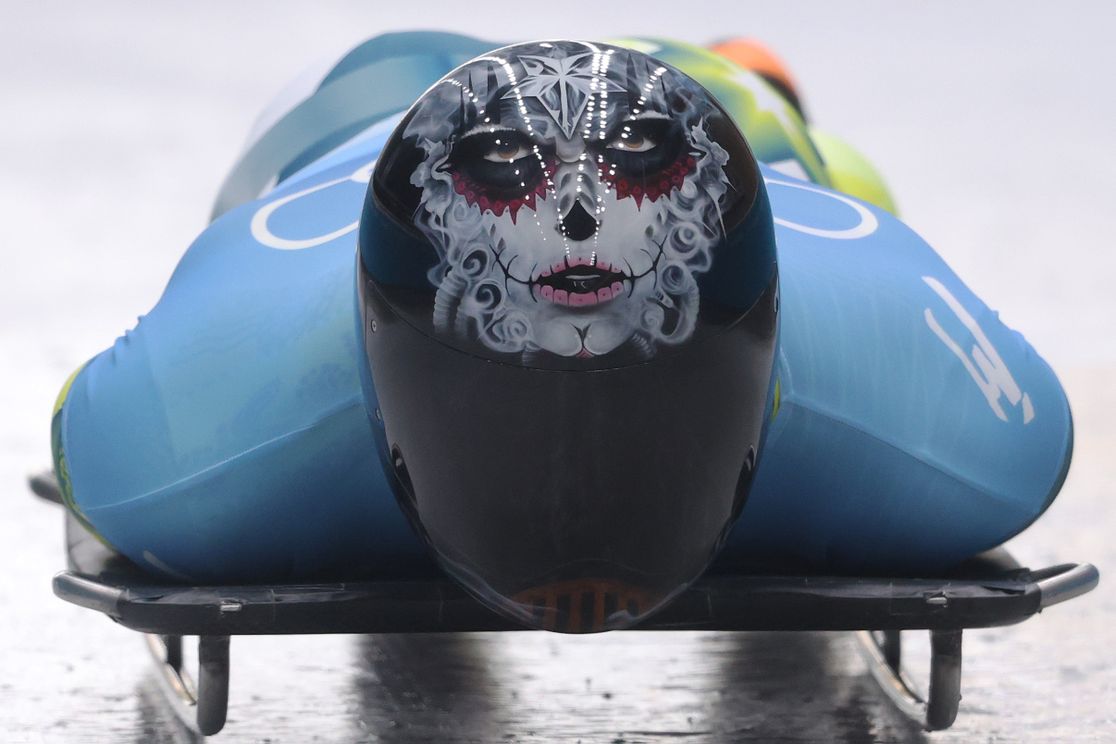






No comments:
Post a Comment